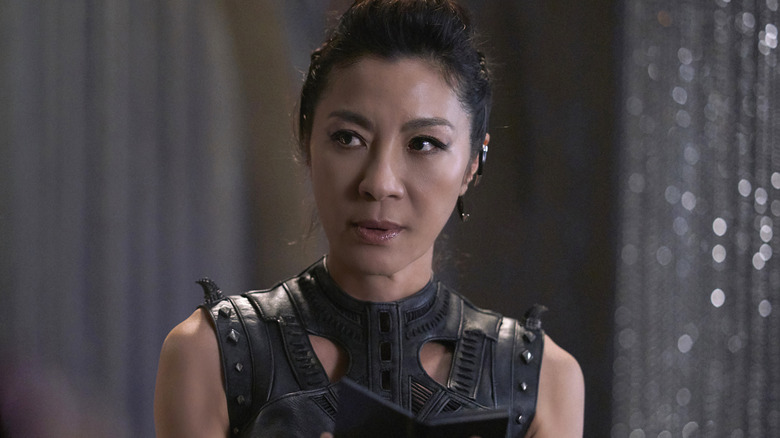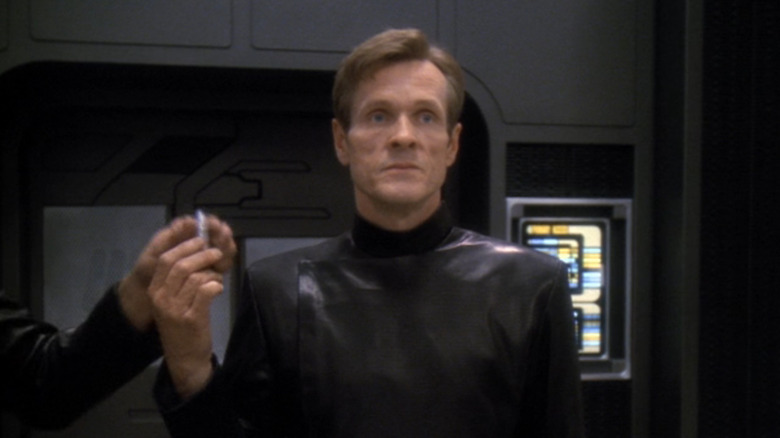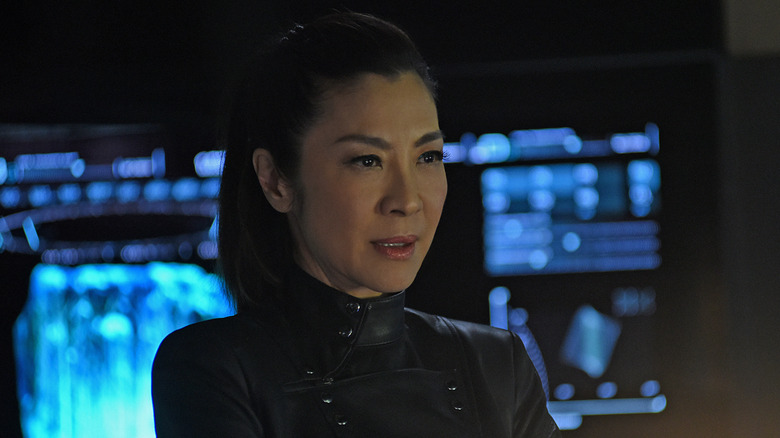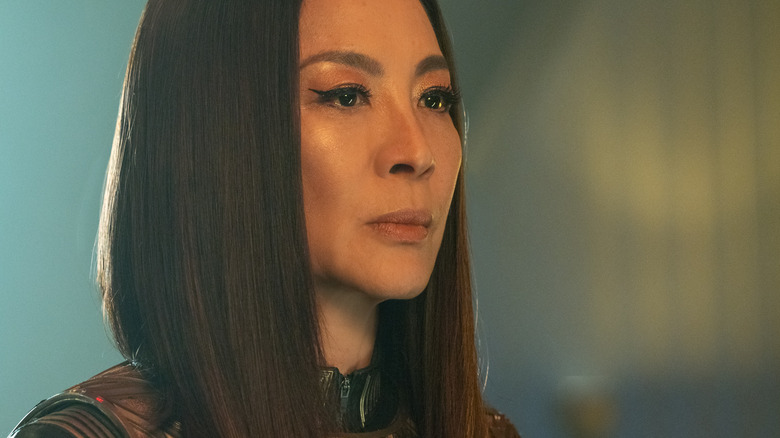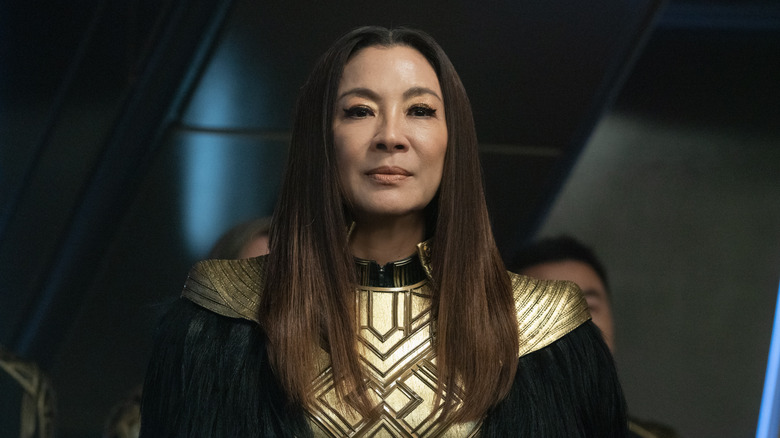Michelle Yeoh's Section 31 Movie Looks Great, But Star Trek Must Remain True To Its Idealistic Heart
Before Michelle Yeoh played multiple versions of herself in "Everything Everywhere All at Once," she was doing the same on "Star Trek: Discovery." Now, Yeoh will star in "Star Trek: Section 31," a film about the ultra-secretive wing of Starfleet that works from the shadows to protect the Federation's security interests, which will release to the Paramount+ streaming service and begins production later this year. While that's amazing news for fans, the film will have to thread a fine line if it hopes to live up to its potential as an instant classic in the "Trek" canon.
According to the press release from Paramount+, Yeoh will reprise her "Star Trek: Discovery" role as Emperor Philippa Georgiou and will join a secret wing of Starfleet. According to executive producer Alex Kurtzman, it was Yeoh's idea to star in a spin-off featuring her character. "Section 31 has been near and dear to my heart since I began the journey of playing Philippa all the way back when this new golden age of 'Star Trek' launched," Yeoh said in the statement. Nodding to her recent Oscar win for "Everything Everywhere All at Once," the actor continued, "To see her finally get her moment is a dream come true in a year that's shown me the incredible power of never giving up on your dreams."
Yeoh's enthusiasm for the project alleviates what might have been fans' biggest fears about the project: that the newly ascendant best actress winner would be too focused on a new stage of her career to devote time and care to a direct-to-streaming release. Well, as far as that goes, we don't have to worry any longer. However, there's still another problem that requires very careful manueving from the writers, and that's Section 31 itself.
What is Section 31 in Star Trek?
First introduced in "Star Trek: Deep Space Nine," Section 31 is a covert wing of the Federation, a bit akin to the CIA here in the 21st century. It was introduced in the Michael Dorn-directed episode "Inquisition," where Dr. Bashir (Alexander Siddig) is taken for questioning by Section 31 agent Luther Sloan (William Sadler), who suspects him of being a Dominion spy and uses ethically questionable interrogation tactics to test Bashir's loyalty to Starfleet.
Since then, Section 31 has continued to appear in "Star Trek," most notably in "Star Trek: Enterprise," and most recently in "Star Trek: Discovery," the show that introduced Michelle Yeoh as Philippa Georgiou. That series further developed Section 31, when it revealed that an artificial intelligence called Control, used to assess threats, was seeking to become sentient and killing anyone who stood in its way. Oh, and if you glance over at "Star Trek: Picard," you'll find that they've also been, uh ... stealing the bodies of dead Starfleet captains.
Those recent developments have been a bridge too far for a lot of fans, and understandably so. Section 31 went from being a ragtag group of individuals using an obscure bit of Federation law to justify their overreach of power on "Deep Space Nine," to an almost omnipotent artificial intelligence and a fully-fledged arm of Starfleet that has manipulated events throughout the timeline on "Discovery." But in addition to straining credulity, Section 31 has thematic implications that run counter to everything for which "Star Trek" has always stood.
Section 31 is a dark contrast with Star Trek's utopianism
On one hand, Section 31 is a fascinating concept, and exactly the sort of thing that could drive the plot of an incredible "Star Trek" movie. It asks questions essential to our time, about artificial intelligence and whether we can trust government to have our best interests at heart. However, it also jars against the prevailing sensibilities of the franchise. You mean to tell us that in this utopian future, where humanity put aside tribal squabbles and pushed into the stars to form a pluralistic, multiplanetary society, we still have clandestine government agencies committing war crimes to maintain power?
Even more gut-churning are the revelations from "Star Trek: Discovery" that Section 31 has been instrumental in the creation of the Federation. That would seem to imply that humanity did not achieve utopia through enlightenment, but through a regression into AI-powered barbarism. If war crimes are required to create the perfect society, then it is no utopia. It is an Omelas.
While it is true that "Star Trek" has never been paradise, its message of progress has rarely faltered so obviously. The Federation went from being at war with the Klingon Empire in "Star Trek: The Original Series" to having Worf (Michael Dorn) on the bridge of the Enterprise in "Star Trek: The Next Generation." Always meant as a thinly veiled Cold War allegory, creator Gene Roddenberry wanted to emphasize that peace and unity were possible, and as the Cold War wound down, Worf represented that dream for peace.
Of course, new enemies cropped up as "The Next Generation" continued, from the money-obsessed Ferengi to the scheming Romulans. Importantly, these were external threats and not evil cabals operating in the shadows of Starfleet, like Section 31.
Here's what could go wrong in Michelle Yeoh's Section 31 movie
The biggest mistake "Section 31" could make would be to lean into the cynical view of the "Star Trek" universe implied by the existence of a black ops organization like Section 31. Few "Star Trek" fans have laid out the case against Section 31 as thoroughly as Reddit user u/pwtercitygymleader, who did so in a widely circulated post to the r/DaystromInstitute board. As they wrote: "The impression we get of Section 31 is that they are not only powerful but fully accepted and sanctioned as a part of the Federation. In fact, they are a founding component of the Federation, which implies that there is no Federation without Section 31. What we see in practice is an organisation with no oversight that operates with impunity without honouring what the Federation stands for. They have carte blanche authority to remove whatever they regard as a threat to the Federation without considering how they are doing it. If there is a problem our enlightened sensibilities and moral progress can not solve, just send in Section 31 and look the other way."
How, the poster goes on to ask, can "Star Trek" fans square our view of an enlightened, pluralistic Federation with an organization like Section 31 that is willing to eschew the most hallowed principles of progressive ethics on which "Star Trek" has always been built? Doesn't its existence run contrary to the central ethos of the "Star Trek" universe?
It is exactly that angle which Michelle Yeoh's "Section 31" should avoid leaning into. If Section 31 is to continue as a part of "Star Trek" canon, it must not be allowed to cross-contaminate the rest of the franchise with the darkness of its "might makes right" mindset.
How Michelle Yeoh's Section 31 movie can overcome the odds
Despite the contentious aspects of Section 31, there's plenty of reason to expect this to be one of the best "Star Trek" movies ever made. Yeoh will star as the Mirror Universe version of Georgiou, a violent dictator who opposed Control and Section 31. That means the "Section 31" movie has an opportunity to swing the pendulum away from the darkness and cynicism that has crept into the "Star Trek" franchise. It will have an opportunity to show the dark side of the Federation while still staying true to what has made "Star Trek" a beacon of hope for nearly six decades.
"Star Trek: Deep Space Nine," the show that introduced the concept of Section 31, walked that line well. Section 31 was a conspiracy within the Federation, but not an overarching or all-powerful one. "Star Trek: Section 31" needs to move the needle back in that direction, for the sake of "Star Trek" as a whole.
In fact, "Star Trek: Section 31" would work best as a rebuke of its own namesake, demonstrating that kindness and decency are the most powerful weapons of all and asserting that groups like Section 31 have no place in a fair and free society. And who better suited to deliver that message than Philippa Georgiou, a former bloodthirsty dictator who slowly reformed herself and has already demonstrated contempt for Section 31 and Control?
It has often been said that when you gaze into an abyss, the abyss gazes back. "Star Trek" has been craning its neck toward that black hole for too long, and Section 31 is the result. It's time to look toward the light once more, to boldly go where only "Star Trek" has gone before.
